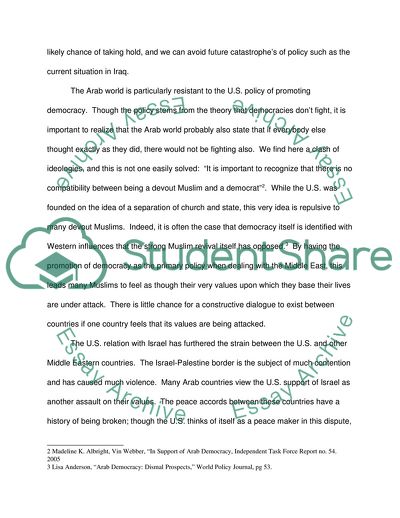Cite this document
(Promoting Democracy in the Middle East Essay Example | Topics and Well Written Essays - 2250 words, n.d.)
Promoting Democracy in the Middle East Essay Example | Topics and Well Written Essays - 2250 words. https://studentshare.org/history/1713111-discuss-the-advantages-and-disadvantages-of-democracy-promotion-as-a-central-and-durable-component-of-us-foreign-policy-in-the-middle-east
Promoting Democracy in the Middle East Essay Example | Topics and Well Written Essays - 2250 words. https://studentshare.org/history/1713111-discuss-the-advantages-and-disadvantages-of-democracy-promotion-as-a-central-and-durable-component-of-us-foreign-policy-in-the-middle-east
(Promoting Democracy in the Middle East Essay Example | Topics and Well Written Essays - 2250 Words)
Promoting Democracy in the Middle East Essay Example | Topics and Well Written Essays - 2250 Words. https://studentshare.org/history/1713111-discuss-the-advantages-and-disadvantages-of-democracy-promotion-as-a-central-and-durable-component-of-us-foreign-policy-in-the-middle-east.
Promoting Democracy in the Middle East Essay Example | Topics and Well Written Essays - 2250 Words. https://studentshare.org/history/1713111-discuss-the-advantages-and-disadvantages-of-democracy-promotion-as-a-central-and-durable-component-of-us-foreign-policy-in-the-middle-east.
“Promoting Democracy in the Middle East Essay Example | Topics and Well Written Essays - 2250 Words”. https://studentshare.org/history/1713111-discuss-the-advantages-and-disadvantages-of-democracy-promotion-as-a-central-and-durable-component-of-us-foreign-policy-in-the-middle-east.


